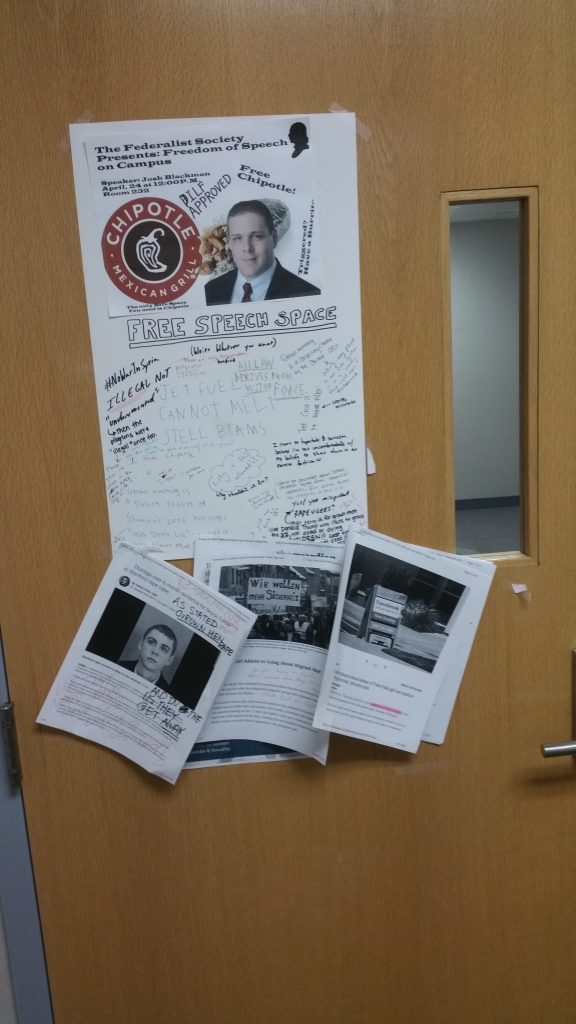Last week, I spoke at the Santa Clara Law Review symposium, and addressed the constitutionality of 8 U.S.C. 1373. My tentative conclusion is that the facial constitutionality of this statute is a close call, but to invalidate it, the courts would have to find that the direction of a state’s workforce is not “proper”–a proposition that goes beyond the Court’s holding in Printz or NFIB. However, I was hesitant to discuss an as-applied challenge, because we did not know the specifics of (1) what sorts of funds would be withheld, (2) how much the funds would amount to, and (3) what sort of notice the states had. Moments before I gave my speech, via Charlie Savage, I tweeted about a series of letters mailed by DOJ to various sanctuary cities, listing the specific sorts of funds that they may be at risk of losing. Specifically, the FY 2016 Byrne JAG grant required recipients to stipulate that they were in compliance with 8 U.S.C. 1373. The amounts at issue were strikingly small ($4 million for New York City, and $20 million for the entire state of California). The letter did not even withhold the funds right away. Rather, the letter stated “Failure to comply with this condition could result in the withholding of grant funds, suspension or termination of the grant, ineligibility for future O.J.P. grants or subgrants, or other action, as appropriate.” It was quite open-ended.
With this background, yesterday’s nationwide injunction concerning “sanctuary cities” (a term with no actual meaning) is perplexing. First, it finds that the President’s January 25 executive order is unconstitutional, but remarked that the Justice Department could still withhold funds where the law permits it to.
[T]his injunction does nothing more than implement the effect of the Government’s flawed interpretation of the Order. It does not affect the ability of the Attorney General or the Secretary to enforce existing conditions of federal grants or 8 U.S.C. 1373, nor does it impact the Secretary’s ability to develop regulations or other guidance defining what a sanctuary jurisdiction is or designating a jurisdiction as such. It does prohibit the Government from exercising Section 9(a) in a way that violates the Constitution.
In other word, DOJ can do exactly what it said it would do in the letters linked above. So what’s the point of the nationwide injunction? (See Howard Wasserman’s post about whether a nationwide, or really universal, injunction was even appropriate here). This opinion mostly serves as a symbolic victory, with little actual teeth.
Second, the crux of the opinion is that because the executive order was not specific as to what funds would be withheld, the vague order violates due process. That would have been enough to enter the injunction. Instead, the court unnecessarily reached other important constitutional questions, finding potential violations of the spending clause and commandeering doctrine. (As an aside, the commandeering doctrine is an application of the necessary and proper clause, not the 10th Amendment standing by itself, as the court erroneously stated on p. 41). These are very difficult questions, and it was improper (no pun intended) for the Court to prematurely address these questions.
Third, the court continued the recent practice of citing statement made by the President, and now Attorney General, to contradict representations made in court by the Justice Department. At bottom, the court believes the executive branch is attempting to mislead the court. This distrust is part and parcel of the resistance by the judiciary.
I’m reminded of an exchange in NFIB v. Sebelius between Justice Scalia and Solicitor General Verrilli, as I recount in Unprecedented:
Justice Scalia was not persuaded that the penalty was a tax for any purposes. On the next day, he asked Verrilli directly, “The president said it wasn’t a tax, didn’t he? . . . Is it a tax or not a tax? The president didn’t think it was.” Verrilli, no doubt frustrated by this question, evaded it with some Washington-spin: the president, Verrilli noted, had said that the penalty “wasn’t a tax increase,” but he didn’t say it wasn’t a tax.
In another time, when the President misled the American people about his signature achievement, courts were praised for ignoring his actual words, and were celebrated for bending over backwards to rewrite statutes in order to save their constitutionality. Today, courts, as part of the resistance, go out of their way to reach difficult constitutional questions of first impression, give executive orders the most uncharitable construction possible, and take fairly opaque statements by the executive branch to contradict official representations by the Justice Department. My how things change.
Had President Trump not issued his sanctuary city order back on January 25, and merely sent out these letters, there would be no nationwide injunction. Here, the Justice Department, which administers the grants, is well within its authority to require compliance with the terms these cities and states already consent to. I see a parallel to his travel bans. Had President Trump quietly instructed his State Department officials to quietly put on hold any visa application from these countries, and to suspend specific visas of individuals from these nations, without the dramatic flare of an executive order, there would not have been a nationwide injunction.
This early bravado has, in no small part, led to defeat after defeat in court.

